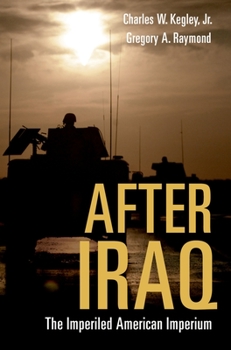After Iraq: The Imperiled American Imperium
Select Format
Select Condition 
Book Overview
As the year 2001 unfolded, the United States stood at the apex of global power, possessing unrivalled military capabilities, a vibrant economy, and--most of all--great self-confidence about its security. The terrorist attacks of 9/11 shattered America's prevailing illusions of invulnerability, prompting the world's sole superpower to embark on a revolutionary national strategy that led to a preventive war against Iraq. Will the United States be safer and more secure as a result? This book shows why America's new assertively unilateral foreign policy will actually create perils for the next generation of Americans. Written by two seasoned scholars, After Iraq conducts a sweeping survey of America's present position in the global arena and identifies the opportunities and risks that the United States will likely face once the war in Iraq draws to a close. Kegley and Raymond provide an insightful overview of the U.S. response to the unconventional threats posed by global terrorism as well as a searching assessment of the challenges created by the rise of China and other emerging competitors. They argue that the current course of American foreign policy will harm the country by setting dangerous precedents that undermine the moral and legal restraints--which were built painstakingly over the past century--on when and how states may use force. Drawing upon a rich array of historical parallels and empirical evidence, the book illuminates instances in which previous great powers embarked on similar self-defeating strategies. Like the U.S. today, these states once stood at the pinnacle of world power. But due to misperceptions about what they could accomplish with unilateral, preventive uses of military force, they made short-run decisions that undermined their long-term strategic interests. With Americans facing questions about how to combat global terrorism, how to diffuse the nuclear threats of Iran and North Korea, how to adjust to the growing power of China and India, and how to repair relations with traditional allies, After Iraq charts a path for restoring America's reputation and leadership in the world to strengthen both U.S. and international security in the turbulent decades ahead.
Format:Paperback
Language:English
ISBN:0195177029
ISBN13:9780195177022
Release Date:September 2006
Publisher:Oxford University Press, USA
Length:176 Pages
Weight:0.62 lbs.
Dimensions:0.5" x 6.2" x 9.2"
Customer Reviews
1 rating
Ethical Sanity, Sensible Guidelines
Published by Thriftbooks.com User , 18 years ago
I am in Boise, Idaho, where I came to hear Al Gore deliver the single most sensational and sensible lecture I have ever heard in my lifetime. The DVD and the book titled "Inconvenient Truth" do not do him or his message justice. It was in this context that I discovered that Boise, Idaho is a hotbed of ethical sanity. The Frank Church Institute (sponsor of Al Gore's visit to Boise) and these two authors, one of whom is the Frank Church Professor of International Relations, the other the Corporate Secretary of the Carnegie Council for Ethics in International Affairs, have all of the moral credibility and legitimacy that the Bush-Cheney regime lacks. I bought this book while visiting Boise State University, and I believe it may well be one of the most important works relevant to recovering from the enormously mis-guided, inept, and corrupt practices that Bush-Cheney have forced upon all of us. As a moderate but estranged Republican, I heartily embrace the solid reasoning of these two authors. The most important part of the book is the final section that I have marked very heavily. The authors highlight the number of military interventions the US has undertaken, making the important point that Bush-Cheney are not the first to abuse military power, but perhaps the first to do so in such an outrageously ill-conceived manner. They draw respectfully on historian Niall Fergusson's summary of American interventions and this is worth repeating here: 1. Impressive initial military success 2. Flawed assessment of indigenous sentiments 3. Strategy of limited war and gradual escalation of forces 4. Domestic disillusionment in the face of protracted and nasty conflict 5. Premature democratization 6. Ascendancy of domestic economic considerations 7. Ultimate withdrawal There you have it. The authors go on to outline "Rules for Rivals" and I will not summarize those--buy the book. The most important observation made by the authors is that if one pays attention to an idea new to me, the Composite Index of National Capabilities (CINC), then one can quickly see that the US pales in comparison to China, and simply does not have the capacity for sustained global warfare in the conventional sense. The authors outline several characteristics of the emerging collapse of US foreign policy and credibility and effectiveness, not least of which is their proper emphasis on the failure of American education. This is a very important book, and it deserves to be noticed by the varied book sections, especially the Boston Globe, the New York Times, and the Los Angeles Times. As one who can be bombastic at times, I especially admired the manner in which the authors made their case in an even-handed relatively neutral manner. Boise, Idaho is a very sensible place! America would do well to absorb and act on the common sense thinking they are doing here. Blessed Unrest: How the Largest Movement in the World Came into Being and Why No One Saw It Coming Ecologi





